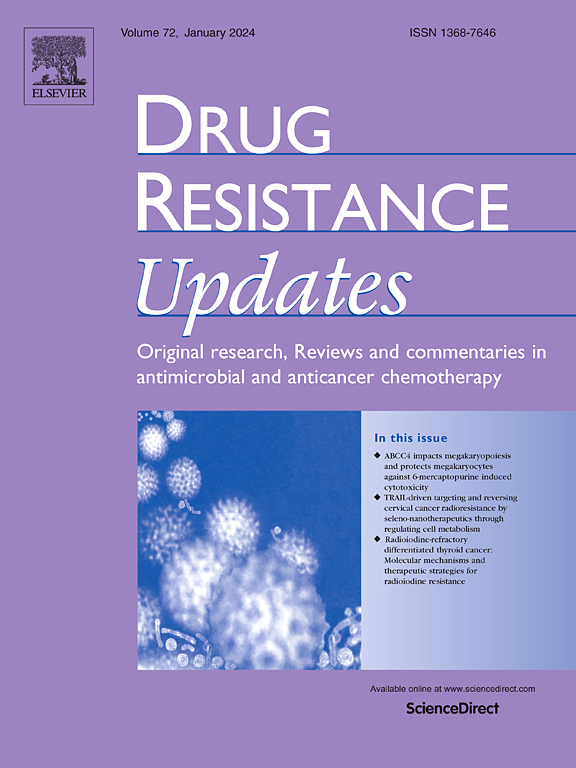靶向 NQO1 可诱导铁变态反应,并在免疫疗法耐药的 KEAP1 基因缺陷癌症中激发抗肿瘤免疫力
IF 21.7
1区 医学
Q1 PHARMACOLOGY & PHARMACY
引用次数: 0
摘要
免疫疗法给癌症治疗带来了革命性的变化,但免疫疗法的疗效仍然有限。对铁蛋白沉积的抵抗是Kelch样ECH相关蛋白1(KEAP1)突变肿瘤治疗效果不佳的原因之一。然而,KEAP1突变肿瘤抵抗免疫疗法的具体机制尚未完全明了。在这项研究中,我们发现KEAP1的功能缺失会导致对铁变态反应的抵抗。我们发现NAD(P)H醌脱氢酶1(NQO1)是核因子红细胞2相关因子2(NRF2)的转录靶标,并揭示了在KEAP1缺失的肿瘤中诱导NQO1介导的铁蛋白沉降可触发抗肿瘤免疫级联反应。此外,我们还发现 NQO1 蛋白水平可作为预测临床肿瘤患者对免疫疗法敏感性的候选生物标志物。我们在多个临床前肿瘤模型中验证了这些发现。总之,KEAP1突变定义了一种独特的疾病表型,而靶向其关键下游分子NQO1则为免疫疗法耐药患者带来了新希望。本文章由计算机程序翻译,如有差异,请以英文原文为准。
Targeting NQO1 induces ferroptosis and triggers anti-tumor immunity in immunotherapy-resistant KEAP1-deficient cancers
Immunotherapy has revolutionized cancer treatment, yet the efficacy of immunotherapeutic approaches remains limited. Resistance to ferroptosis is one of the reasons for the poor therapeutic outcomes in tumors with Kelch-like ECH-associated protein 1 (KEAP1) mutations. However, the specific mechanisms by which KEAP1-mutant tumors resist immunotherapy are not fully understood. In this study, we showed that the loss of function in KEAP1 results in resistance to ferroptosis. We identified NAD(P)H Quinone Dehydrogenase 1 (NQO1) as a transcriptional target of nuclear factor erythroid 2–related factor 2 (NRF2) and revealed that inducing NQO1-mediated ferroptosis in KEAP1-deficient tumors triggers an antitumor immune cascade. Additionally, it was found that NQO1 protein levels could serve as a candidate biomarker for predicting sensitivity to immunotherapy in clinical tumor patients. We validated these findings in several preclinical tumor models. Overall, KEAP1 mutations define a unique disease phenotype, and targeting its key downstream molecule NQO1 offers new hope for patients with resistance to immunotherapy.
求助全文
通过发布文献求助,成功后即可免费获取论文全文。
去求助
来源期刊

Drug Resistance Updates
医学-药学
CiteScore
26.20
自引率
11.90%
发文量
32
审稿时长
29 days
期刊介绍:
Drug Resistance Updates serves as a platform for publishing original research, commentary, and expert reviews on significant advancements in drug resistance related to infectious diseases and cancer. It encompasses diverse disciplines such as molecular biology, biochemistry, cell biology, pharmacology, microbiology, preclinical therapeutics, oncology, and clinical medicine. The journal addresses both basic research and clinical aspects of drug resistance, providing insights into novel drugs and strategies to overcome resistance. Original research articles are welcomed, and review articles are authored by leaders in the field by invitation.
Articles are written by leaders in the field, in response to an invitation from the Editors, and are peer-reviewed prior to publication. Articles are clear, readable, and up-to-date, suitable for a multidisciplinary readership and include schematic diagrams and other illustrations conveying the major points of the article. The goal is to highlight recent areas of growth and put them in perspective.
*Expert reviews in clinical and basic drug resistance research in oncology and infectious disease
*Describes emerging technologies and therapies, particularly those that overcome drug resistance
*Emphasises common themes in microbial and cancer research
 求助内容:
求助内容: 应助结果提醒方式:
应助结果提醒方式:


